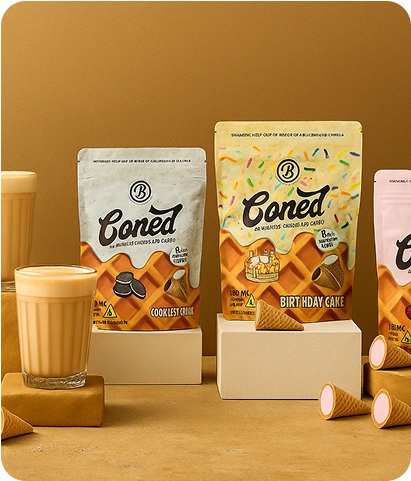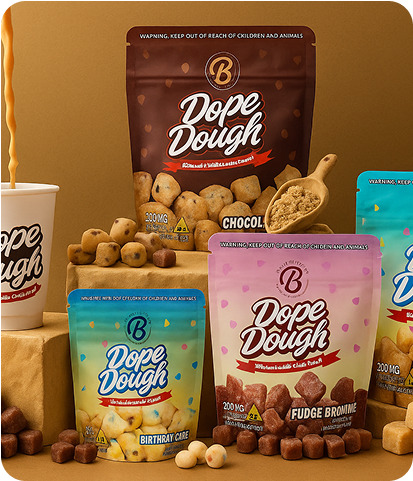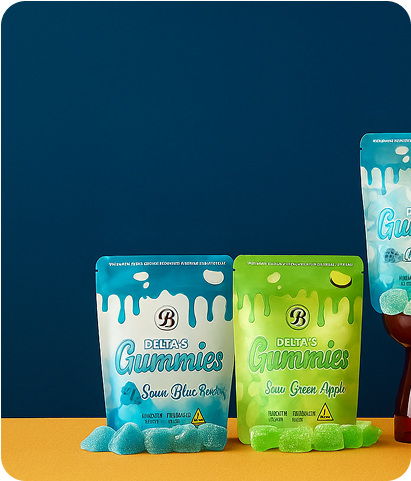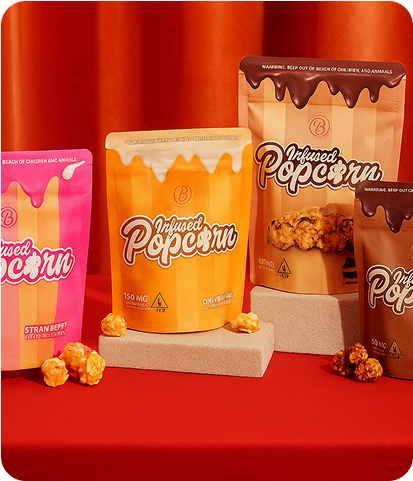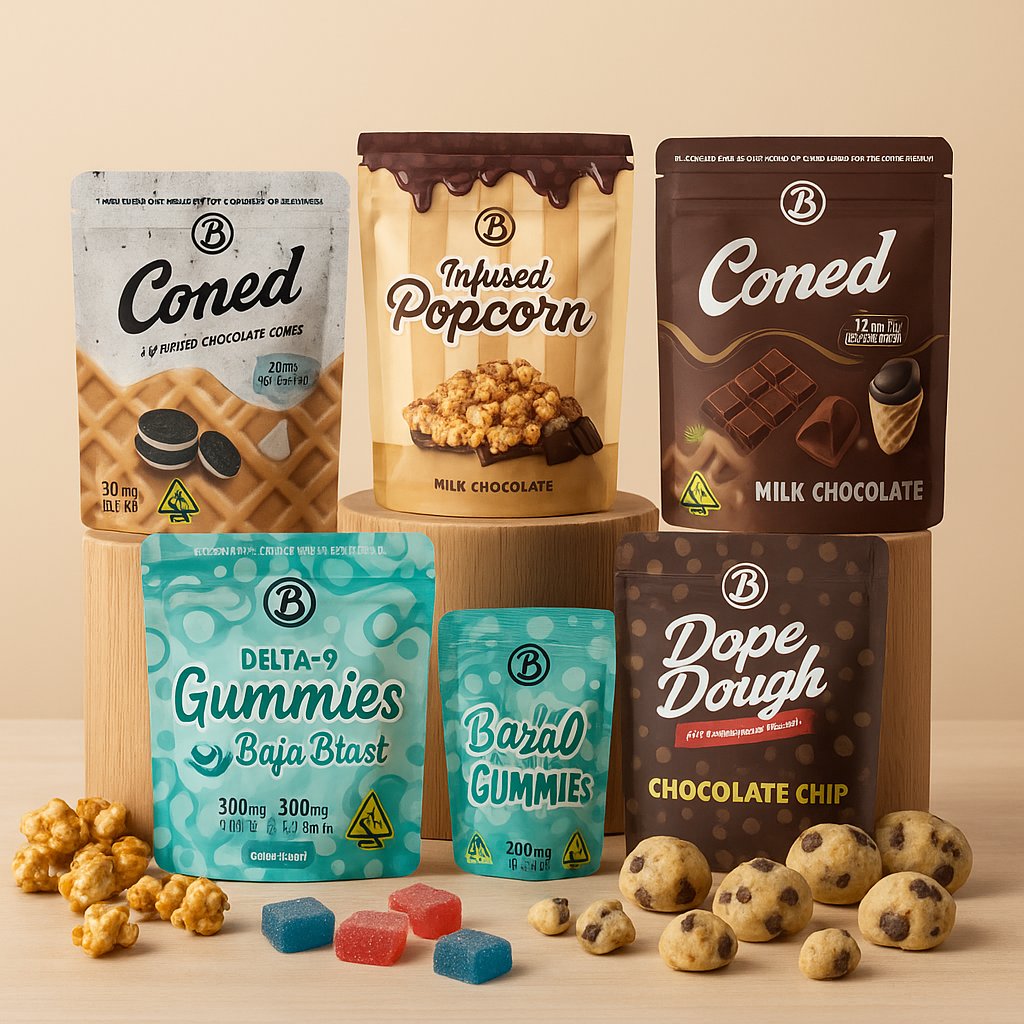
There’s always that one pair everyone compares. Coffee vs. tea. City vs. nature. Spotify vs. people who still burn CDs for “vibe control.”
In the edibles world? It’s CBD vs. Delta-8.
At first glance, they seem like they’re playing the same game (calm, cool, made for chilling), but once you get past the label and actually try them, the difference is kind of hilarious.
One’s like a very polite suggestion to relax. The other is already kicking its shoes off, handing you a cookie, and asking what’s on the playlist.
And yet, somehow, CBD still gets all the good PR. All the “wellness” buzzwords. All the shelf space at the fancy grocery store.
So if you’ve ever chewed a CBD gummy, waited, and squinted at the wall wondering is this it?, or if you’ve met Delta-8 and thought Oh… so this is what everyone was pretending CBD felt like, you’re not alone.
Let’s talk about the difference, the details, and why Delta-8 absolutely wins the battle.
CBD: The Nice Girl Who Doesn’t Text Back
CBD is everywhere. Like, everywhere.
Walk into any boutique, gas station, or tech bro's kitchen and you’ll probably find at least one dusty jar of tincture with a slightly untrustworthy font.
For something that famously doesn’t get you high, it sure made a lot of noise.
CBD actually got the early lead because it played nice with everyone. It wasn’t controversial. It didn’t freak out your grandma. It got a seat at the wellness table and started showing up in products that had no business being “infused” with anything—mascara, toothpaste, nail polish. (No, seriously.)
And for what it’s worth, CBD can be helpful. Some people swear by it for anxiety, sleep, pain, existential dread, etc. But the catch? It’s not consistent, and it’s almost never immediate.
You eat a CBD gummy, and then... wait. Maybe you feel calmer. Maybe your back hurts slightly less. Or maybe you’re just chewing overpriced gelatin and pretending it’s working because you don’t want to be the person who says, “I don’t get it.”
The experience is vague. Muted. Like a jazz cover of a song you don’t like anyway.
The problem isn’t that CBD is bad. The problem is that it’s constantly being framed as something it’s not—fun. And for people looking for a buzz that actually lifts the weight of the day instead of just politely acknowledging it, CBD flops.
Delta-8: The High That Knows Its Place
Now this is where things start to make sense.
Delta-8 THC is a naturally occurring cannabinoid in hemp, pretty much similar to CBD, but with actual personality.
It’s a cousin to Delta-9 THC—the one that gets all the credit (and all the side-eyes). Delta-8 and Delta-9 are both forms of THC, but when people say “THC,” they’re almost always talking about Delta-9. Loud, chaotic, sometimes amazing, sometimes a lot.
The real kicker? Delta-8 actually binds to your brain’s CB1 receptors (the same ones Delta-9 hits) just more gently. That means it can shift how you feel, lift your mood, relax your body, and smooth out the mental noise in a way CBD simply... doesn’t.
Because CBD doesn’t really bind to those receptors at all. It’s over there offering moral support while Delta-8 is in the driver’s seat, adjusting the volume and dimming the lights.
Delta-8 doesn’t need to promise you inner peace or chakra realignment or whatever else the candle aisle is selling. It’s not here to spiritually cleanse you. It’s just here to take the edge off and give you a moment that feels, finally, like less.
And here’s the part that really makes Delta-8 king of the edibles lane: you don’t have to plan your whole life around it. You can take a gummy, sneak a cookie dough bite, sip a chilled seltzer, and still show up. Still text back. Still have a meaningful conversation, crush a workout, or throw a chill dinner party with actual joy in your face.
Calm, without the comedown. Focused, but floaty. And that’s already more than CBD can say.
Also read: What Is The Difference Between Delta-8 And Delta-9?
One Molecule, Two Very Different Realities
This part gets science-y, but we’ll keep it snackable.
CBD is non-psychoactive. It doesn’t bind to your CB1 receptors—the part of your brain that controls mood, memory, and that delicious feeling of “ha, this is funny for no reason.”
Delta-8 does. Not as aggressively as Delta-9 (the main THC compound in weed), but enough to give you a real buzz. A kind one. The kind that lets you stay upright and functional, but softer. Calmer. Slightly amused by everything.
In other words, CBD works in the background. Delta-8 actually clocks in.
You want to feel something, ideally something good. Why waste that moment on something that can’t even commit to a vibe?
The Showdown
Let’s talk formats.
CBD gummies? They’re basically expensive fruit snacks with a sprinkle of hope (and usually way too much sugar). You eat them because someone told you they might help you feel less overwhelmed, and because chewing something soft is comforting when your brain’s running twenty open tabs and at least three of them are just anxiety loops.
To be fair, CBD holds its own when it comes to variety. Tinctures, drinks, drops, patches, balms… you name it. The product menu is stacked. So if you’re just looking for a daily supplement to maybe take the edge off without any shift in perception? CBD’s fine.
Delta-8, on the other hand? That one’s bringing vibes and variety. Yes, there are gummies, and yes, they actually work. Not with a bang, but with a soft fade into you know what, I’m doing okay.
And just like CBD, Delta-8 doesn’t stop at gummies. You’ll find it in chocolate-dipped cones, delicious cookie dough bites, bubbly seltzers, even infused sugar for your coffee if you’re feeling cute and customized. Basically, if it’s edible, someone’s probably made a Delta-8 version of it.
Now, dosage. Big one. With CBD, people will toss you something that says 10mg and expect you to believe that it’s “relaxing.” With Delta-8, you feel 10mg. You notice 20mg. And 25+? That’s when things start leaning into true fuzzy-slipper energy.
The sweet spot depends on your vibe and how long you want to stay in it—but the point is, you’re not just paying for a flavor. You’re paying for a feeling.
Storage? Same deal. Most edibles are chill about it. Keep them cool, dry, sealed, and away from your roommate who doesn’t read labels. Gummies last. Cones and cookies stay fresh for weeks. No weird rituals, no fridge space needed unless you’re hoarding.
So TL;DR—it all comes down to what you’re actually looking for.
If you want something you can nibble while still pretending you’re just “managing your wellness,” go ahead, keep the CBD in your drawer.
But if you’re ready for the kind of edible that quietly improves your whole evening without knocking your plans off the calendar? Delta-8 is already waiting on your coffee table.
Why CBD Still Hangs Around
So why does CBD still get so much attention?
Because it’s safe. It’s familiar. It doesn’t challenge anything. It’s the avocado toast of cannabinoids.
It promises “support” and “balance” without offering anything you can actually measure. And that works for a lot of people. Especially if you’re scared of feeling different or still convinced any kind of THC will turn you into a conspiracy theorist with red eyes and a guitar.
But Delta-8 is for the rest of us. The tired, the overstimulated, the ones who just want to slow the hell down without getting sent into the sun. It’s cannabis with manners. Chill with a backbone.
And once you’ve felt it? Going back to CBD feels like asking sparkling water to solve your problems. Refreshing? Maybe. Effective? Nah.
The Legal Gray, Lightly Salted
Let’s talk legality—for a second, anyway.
CBD and Delta-8 THC both come from hemp, and under federal law, that means they’re legal if they contain less than 0.3% Delta-9 THC by dry weight. But that’s just the federal stance—states can (and do) make their own rules.
Delta-8 exists in a weird gray area. Some states have embraced it, others have banned it outright (think Alaska, Colorado, and Delaware), and a few are still sorting it out. So before you try Delta-8, it’s worth checking your local laws.
CBD? It’s far less controversial. Hemp-derived CBD is legal in almost every state, though how it's regulated can still vary.
Just remember: legal doesn’t always mean harmless, and banned doesn’t always mean bad. What really matters is how something makes you feel—and for some people, Delta-8 offers a gentler, more balanced alternative to traditional THC. If that sounds like your vibe, just make sure it’s legal where you live first.
Also read: Delta-8 Edibles: How Old Is Old Enough to Buy?
CBD vs. Delta-8: The Winner Is Obvious
CBD had its moment. It’s not going away. It still has its little place in the world of “support” and “balance” and whatever else makes people feel like they’re doing something without actually feeling anything.
But if you’re reaching for an edible because you want the vibe to shift (not just theoretically, but for real) CBD’s not the one.
That’s the real clash of this whole versus thing. Delta-8 just works. Quietly. Reliably.
It’s the edible that turns your couch into a five-star resort, your Tuesday into a movie you accidentally love, and your group chat into the funniest place on earth.
All of it, of course, wrapped in true Baked Bags style. From indulgent ice cream cones and creamy cookie dough bites, to crisp Kush Klaw seltzers, fruity gummies, and mischievously good infused popcorn, it’s the kind of lineup that flips a “maybe later” into a very casual “oh absolutely.”
Stay chill, stay curious, and keep snacks on deck.


